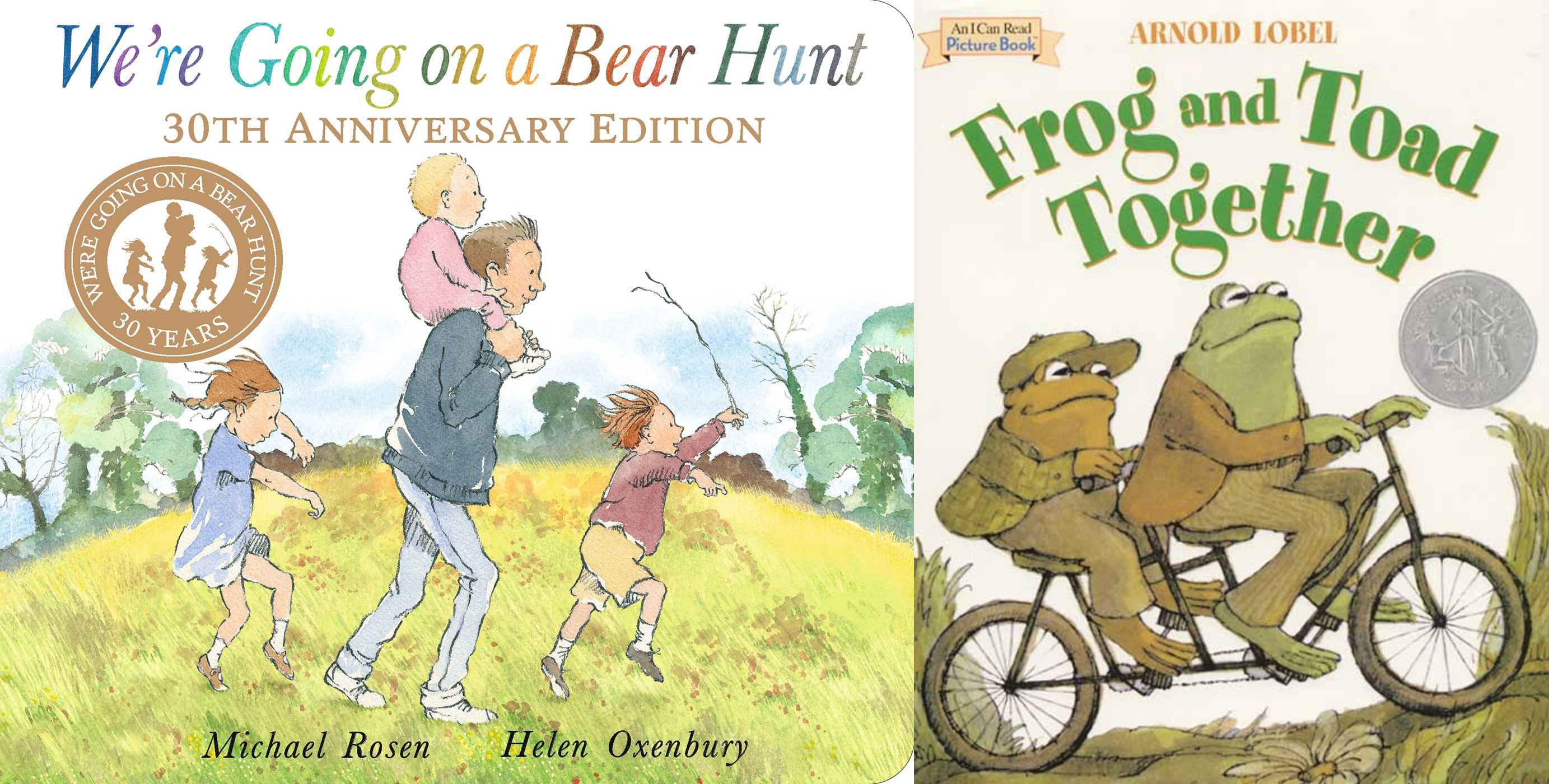Picture Credit: Harper Collins, Simon & Schuster, with an assist from Pinetools.com || As is common with ChatGPT: explain this to me in a way that a five year old would understand.
I have five grandchildren living near me. The oldest one is three, the second oldest is two. The two oldest ones are boys, and they love me. Grandpa is a lot of fun. I read to them, and play with them. I am slightly unpredictable to them, enough so that it makes them test me as they play with me. I never do anything their parents would not like, but the parents appreciate the way I take care of them. I even change diapers!
But from my grandchildren, and remembering my children, I appreciate the simplicity of books for young children. So, tonight I want to comment on We’re Going on a Bear Hunt, and the short story inside Frog and Toad Together, entitled “Dragons and Giants.”
We’re Going on a Bear Hunt displays a family who think going on a bear hunt is easy, and so they don’t prepare properly for it. They proclaim many times, “We are not afraid.” After many going through many obstacles to find a bear, once they find a bear they run away back to their home as the bear chases them. They lock the door and hide under the covers in the master bedroom. As I said to my three-year old grandchild, “Were they afraid?” He thought for a moment and said “Yes.” Smart kid.
In the story “Dragons and Giants,” Frog and Toad admire the bravery of those they have read about fighting dragons and giants. They muse as to how brave they are, and conclude that they are pretty brave. They go on a hike outside to prove their bravery, are nearly eaten by two creatures and almost crushed in a landslide while proclaiming that they are not afraid. Then they run home, go to the bedroom, and tell each other how grateful they are to have such a brave friend, while they hide safely at home.
Now, what does this have to do with the FOMC [Federal Open Markets Committee]? They want the honor accorded to Paul Volcker for his extraordinary efforts for extinguishing inflation in the late ’70s / early ’80s. Regarding inflation, things are nowhere near as bad as in 1981, but they want to sound stern about inflation, even if it isn’t a big threat. They want to look good and courageous. Thus they proclaim loudly their fight against inflation.
Sadly, because of too much debt, deflation is the greater threat, and once it is too late because monetary policy has been too tight for too long, the FOMC will panic and loosen rates more than they should when the recession hits, setting the stage for the next mistakes of the FOMC. (Can Saturday Night Live parody the FOMC? It deserves parody.)
The FOMC runs from panic to panic, never willing to admit that they made mistakes that helped create the panics. It’s a foolish system. A gold standard would be better. I offer my own standard for those who like fiat money.
Replace the FOMC with a computer. The key variable is the difference between 10-year and 2-year Treasury yields. When the difference is greater than 1.5%, raise short rates until the difference is less than 1.5%. When the difference is less than 0.25%, lower short rates until the difference is more than 0.25%, unless it would make the policy rate negative.
This would be much more stable than what we have at present. Rather than proclaiming bravery and running away when they are wrong, it would be far better for the FOMC to be quiet, and not take aggressive policy actions.
Oh, and for those that want to know what the FOMC should do, I tell you they should loosen 1%! What will they do? Fools that they are, they will tighten.


I like the idea of automating these functions too. Professor Friedman is the first person who I knew of that suggested this.
1. Backing of the dollar: a basket/portfolio of commodities. (I wonder if we could actually deliver them. I think the commodity indices usually hold about 20 items, so if you wanted the commodities instead, you would get a few gallons of oil, some gasoline, nickel, iron, etc., for every $100. I am guessing $ would practically never be exchanged for the commodities.) That solves the fiat problem.
2. I don’t know enough about interest rate/debt/bond markets, but your suggestion sounds reasonable.
Thanks for the post.
The question is how big should the Fed’s balance sheet be? In a world of bloated and expanding central bank balance sheets are the signals given off by the yield curves in sovereign debt still meaningful? It seems likely that central bank balance sheets will continue to ratchet up higher in size over time – it is tha path of least resistance politically provided inflation doesn’t get too bad. The Fed cannot follow the “market” because it will have become the market (at least on the long end).